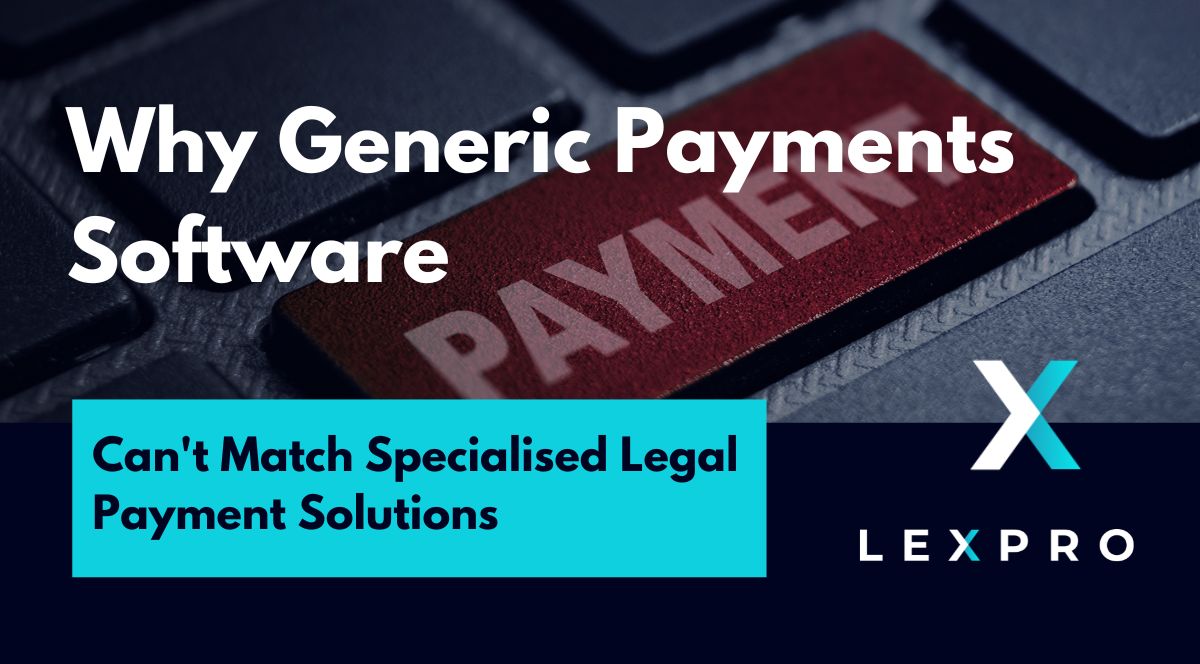Estimated reading time: 6 minutes
Key Takeaways |
|
• Generic payment systems lack the legal-specific approval workflows required by South African law firms |
|
• Off-the-shelf solutions cannot integrate with trust accounting systems, creating dangerous audit trail gaps |
|
• Bank account verification features essential for fraud prevention are absent from standard payment platforms |
|
• Purpose-built legal payment solutions protect firms from regulatory violations and disciplinary action |
Introduction
When a law firm secretary processes a R5,000,000 payment from a client’s trust account, the stakes couldn’t be higher. A single misdirected payment, an unauthorised transfer, or an incomplete audit trail can trigger Legal Practice Council investigations, damage claims from the client, or worse—complete practice shutdowns.
Yet many legal practices attempt to manage these high-risk transactions using generic payment platforms designed for retail businesses or general corporate use. The reality is stark: payment authorisation software built for legal practices operates in a completely different regulatory universe than standard business payment tools.
The Legal-Specific Requirements Generic Software Cannot Address
Trust Account Payment Workflows
Legal practices process both ordinary business payments and trust payments. Every transaction must distinguish between trust funds (held on behalf of clients) and business funds (firm revenue). This fundamental separation creates workflow requirements that generic payments software simply cannot accommodate.
Required Legal Payment Workflow:
- Legal secretary captures payment requisition with matter reference
- System verifies funds are available in correct trust account
- Director reviews and authorises using digital certification
- Bookkeeper generates batch file with verified bank account details
- System creates complete audit trail linking payment to client matter
Generic payment platforms might handle basic capture and processing, but they cannot provide the matter-specific verification, legal-grade digital certification, or trust account segregation that South African law firms require.
Digital Certification Requirements
South African law recognises electronic signatures under the Electronic Communications and Transactions Act. However, legal payment authorisation demands verifiable digital certification that proves the authorising director reviewed and approved the specific transaction.
Generic payment requisition software typically offers basic approval workflows with email notifications or simple click-to-approve functions. These fall short of the standards legal practices must maintain for authentication, integrity verification, and comprehensive audit trails.
The Integration Gap That Creates Risk
The Trust Accounting Disconnect
The most dangerous limitation of generic software for payments is its inability to integrate with legal trust accounting systems. When payment processing occurs in isolation from accounting records, firms create catastrophic risks:
Audit Trail Gaps: Payments processed outside the accounting system leave incomplete records. When the Legal Practice Council or Legal Practitioners’ Fidelity Fund inspects trust accounts, disconnected payment records suggest poor internal controls.
Reconciliation Problems: Bookkeepers must manually match generic payment platform records against trust account ledgers, introducing errors and making real-time trust account visibility nearly impossible.
Matter-Level Tracking Failure: Generic platforms don’t understand legal matters. They process “Payment to Supplier X” but cannot link that payment to “Conveyancing Matter 2024/0123” or verify the payment against the specific client’s trust balance.
Batch Processing Limitations
Legal practices typically process multiple trust account payments simultaneously—perhaps 20 property transfer payments, 15 litigation disbursements, and 10 estate distributions in a single batch. Generic payment platforms treat these as individual transactions, creating massive inefficiency.
Purpose-built online payments software handles batch processing with single authorisation for multiple payments, automated verification against trust balances, and consolidated audit trails.
The Fraud Prevention Features Generic Platforms Lack
Bank Account Verification
One of the most critical differences is bank account verification capability. With payment fraud reaching alarming levels in South Africa, verifying recipient bank account details before transferring trust funds is essential.
Generic payment platforms assume you’ve verified account details externally. They process whatever account number you provide, offering no safeguards against transposed digits, fraudulent account details, or outdated information.
Secure payment software designed for legal practices integrates bank account verification directly into the payment workflow. Before processing any transfer, the system verifies the account exists, matches the stated account holder, and flags discrepancies for review.
This prevents the nightmare scenario every legal practice fears: transferring millions in client funds to a fraudulent account, then facing Fidelity Fund claims and disciplinary action.
Multi-Level Approval Controls
Legal payments require sophisticated control structures that generic systems cannot provide:
- Segregation of Duties: The person capturing payment details cannot authorise
- Value-Based Escalation: High-value payments require senior partner approval
- Matter-Type Requirements: Certain matters require dual authorisation
- Trust vs Business Separation: Clear workflow differences based on fund source
The Cost of Using the Wrong System
Regulatory Violations
The Legal Practice Council expects law firms to maintain comprehensive internal controls over trust account payments. During inspections, incomplete audit trails, and inadequate approval workflows constitute evidence of poor practice management.
The Legal Practitioners’ Fidelity Fund evaluates claims based partly on whether firms had proper controls in place. Firms without robust payment authorisation systems may face limited Fund protection.
Operational Inefficiency
Generic payment platforms create:
- Hours spent on manual reconciliation
- Duplicate data entry across systems
- Time wasted fixing preventable errors
- Inability to generate consolidated reports by matter or client
What Purpose-Built Legal Payment Solutions Provide
Payment authorisation software designed specifically for South African legal practices delivers:
Legal-Grade Security:
- Multi-factor authentication for authorising parties
- Bank account verification preventing misdirected payments
- Advanced encryption protecting sensitive data
Proper Integration:
- Seamless connection with legal accounting systems
- Automated reconciliation eliminating manual processes
- Matter-level payment tracking
- Real-time trust balance verification
Regulatory Protection:
- Complete audit trails satisfying Legal Practice Council requirements
- Documented approval workflows demonstrating internal controls
- Comprehensive reporting for inspections
- Settled payment capture integrating with trust accounting
Work-from-Anywhere Capability:
- Web-based access supporting hybrid work
- Secure remote authorisation
- Cost-effective per-transaction pricing
Frequently Asked Questions
Can generic payment software be customised for legal practice use?
Whilst some platforms offer customisation, they cannot address fundamental architectural limitations. Legal payment systems must integrate deeply with trust accounting capabilities requiring purpose-built design.
What makes bank account verification so critical for legal payments?
Legal practices hold funds in trust for clients, making firms responsible if payments are misdirected through fraud or error. Bank account verification confirms recipient details before transfer, protecting both the firm and clients from Fidelity Fund claims and disciplinary action.
How does payment software integrate with legal accounting systems?
Purpose-built online payments software connects directly with legal accounting platforms, automatically capturing settled payments, updating trust ledgers, and maintaining complete audit trails. This eliminates manual data entry and ensures payment records align perfectly with accounting records for regulatory inspections.
Conclusion
The legal profession operates under unique regulatory requirements that generic business payment software cannot address. From trust account segregation to digital authorisation, from bank account verification to Legal Practice Council audit requirements—legal payments demand specialised solutions.
Using generic software for payments in a legal practice isn’t just inefficient—it’s dangerous. The regulatory risks, fraud exposure, and operational challenges create unnecessary vulnerability.
For South African legal practices serious about protecting clients, maintaining regulatory standing, and operating efficiently, investing in proper legal payment technology is essential.
Ready to eliminate payment risks and streamline your firm’s financial workflows? Discover how Lexpro Payments provides the security, integration, and legal-specific features your practice needs. Book your free demonstration today and see how purpose-built legal payment software transforms your practice operations.








